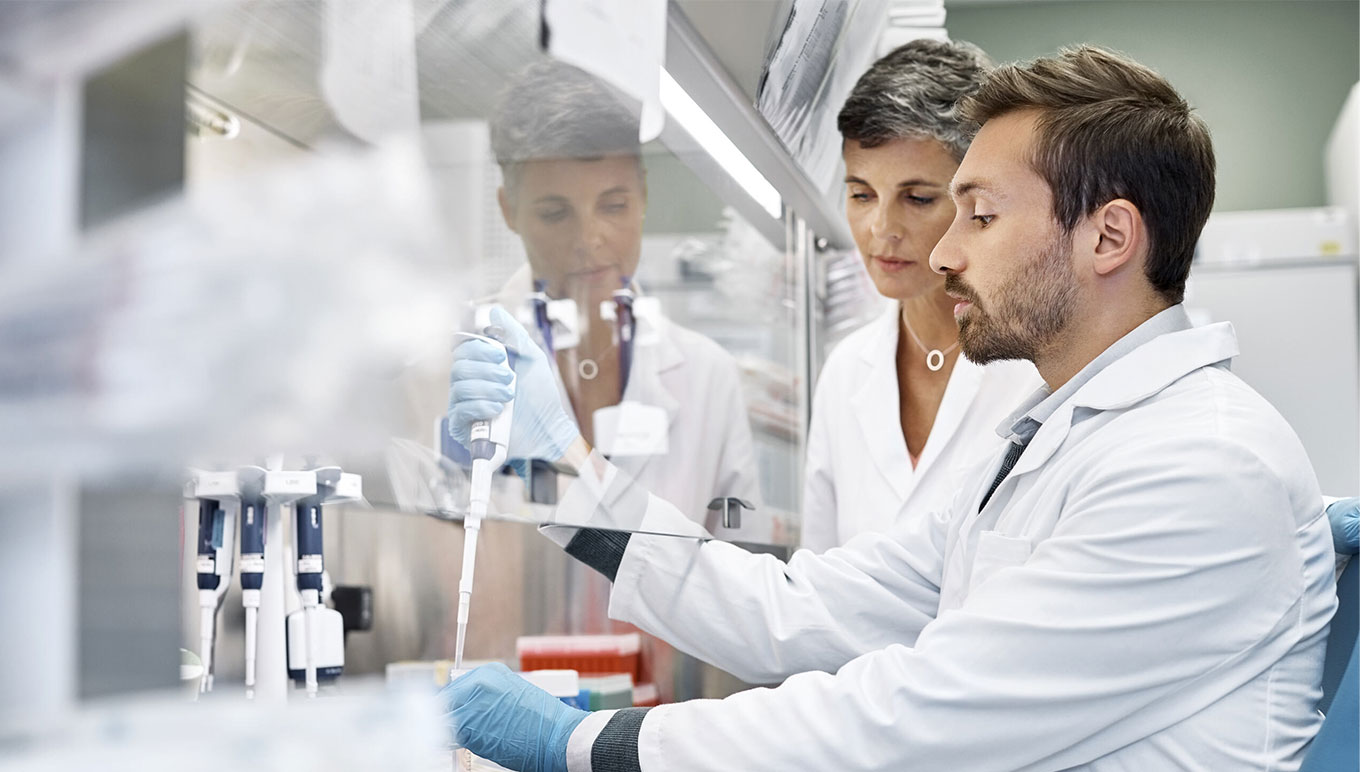Life Sciences ERP: A Complete Guide for Regulated Manufacturers
Life Sciences ERP: A Complete Guide for Regulated Manufacturers
Life Sciences ERP: A Complete Guide for Regulated Manufacturers
7 Aug 2025
 Steve Reynolds | Senior Product Manager
Steve Reynolds | Senior Product Manager
Managing a nutraceutical, dietary supplement, cosmetics or personal care business means juggling formulas, ingredients, production schedules and strict regulations.
An enterprise resource planning (ERP) system can act as a single operations hub for all of this. ERPs bring together all core business functions (finance, manufacturing, inventory, quality and more) into one integrated software platform. By collecting all of this data in one place, an ERP gives you a 360° view of your business, letting you see raw material availability, production costs and order status in real time to improve planning and reduce manual errors.
But for life sciences companies, strict regulatory compliance and complex supply chains mean you need a solution that does more than a standard ERP. You need built-in support for audit trails, electronic signatures and validation to meet FDA regulations, as well as industry-specific workflows (like recipe/formula management and electronic batch records) for tracking product quality.
You also want to make sure you’re using a modern, cloud-based life sciences ERP system, offering scalability and real-time data access across multiple sites. These solutions provide the ability to automate routine tasks across departments so that processes are consistent and hands-off for your team.
In short, a life sciences ERP integrates supply chain management, production planning and compliance control into one platform, helping regulated manufacturers plan resources while ensuring regulatory requirements are met. In this blog, we’ll cover everything you need to know to research and shortlist systems.
Who Can Use a Life Sciences ERP?
Life sciences ERP software is used by nutraceutical, cosmetics and other life sciences companies that must comply with stringent regulations while managing complex manufacturing processes. If you fall into one of those categories, you can expect to rely on an ERP to unify finance, production, quality and sales data, eliminating data silos and boosting productivity. Everyone in your company will work with the same up-to-date information, which means inventory levels, sales forecasts and production plans automatically stay in sync.
In practice, both emerging life sciences companies and established manufacturers adopt life sciences ERP, often replacing homegrown systems or basic accounting software (like QuickBooks) when complexity and compliance demands outgrow them. So whatever stage your business is at, by choosing an ERP for life sciences, you can gain efficiency, traceability and control over every step from lab to market.
How Can a Life Sciences ERP Benefit Your Business?
A tailored ERP for life sciences delivers many advantages for regulated manufacturers like you. Key benefits include:
Regulatory Compliance and Quality Assurance: Built-in validation, audit trails and electronic signatures help your business meet FDA and cGMP requirements with less hassle and manual effort. The system also enforces standardized procedures (for example, via electronic batch or device history records) so all processes are fully documented. This reduces the risk of compliance violations and product quality issues.
Streamlined Operations and Efficiency: Automating and centralizing processes (from order entry to manufacturing to accounting) reduces manual work and errors. Instead of juggling spreadsheets and siloed systems, your teams use one platform that automates routine data entry tasks, freeing them up to focus on innovation and production. What’s more, improved process efficiency speeds up time-to-market for new products, helping you capitalize on new opportunities and boost profitability.
Enhanced Data Visibility and Decision-Making: Because all functions share a single database, your managers get real-time visibility across your business. They can instantly view the status of your production runs, inventory levels or financial reports in dashboards or custom queries. This integrated view enables faster, data-driven decisions (for example, identifying bottlenecks in R&D or spotting opportunities to optimize workflows).
Improved Supply Chain Management: Life sciences ERPs provide advanced inventory and supply chain controls, including lot and serial number tracking, demand planning and automated replenishment. Such features ensure the right materials and products are available when needed and traceable throughout the supply chain. In practice, this means fewer shortages or overstock situations and faster, more accurate responses to recalls.
Cost Savings and Resource Optimization: By consolidating multiple systems into one and reducing time-consuming manual tasks, you can cut IT overhead and labor costs. Better inventory management also means less waste from expired materials, and with ERP-driven forecasting and budgeting, you’re able to optimize resource use and minimize excess inventory, improving your bottom line.
Stronger Data Security and Risk Management: An ERP’s centralized data control allows for tight user-access security and audit controls. That means only authorized personnel can view or change critical records, reducing data breaches or errors. In addition, having all records in one validated system makes audits smoother and decreases the risk of compliance penalties.
Scalability and Growth Support: Leading life sciences ERP software is built to scale. These ERPs handle multi-entity or multi-site operations, support growth into new markets and adapt to increasing transaction volumes. A cloud-based ERP in particular can be rapidly deployed to new facilities or subsidiaries without major hardware investments, future-proofing your IT infrastructure as product lines and headcount expand.
Together, these benefits help life sciences manufacturers become more efficient and compliant in a challenging regulatory environment. By breaking down data silos and automating critical processes, a life sciences ERP can transform both day-to-day operations and strategic decision-making.
What Features Do the Best Life Sciences ERP Systems Offer?
While there’s no one-size-fits-all solution, the best life sciences ERP systems must include general ERP capabilities (production, finance, warehousing, etc.) plus specialized functionality for your industry. Key features typically include:
Regulatory Documentation and Audit Controls: A central document management system to store standard operating procedures (SOPs), validation records, quality reports and other compliance documents. The ERP should enforce audit trails and version control so any change is recorded. These controls ensure that all documentation is complete, easily retrievable and compliant with key regulatory guidelines (including FDA 21 CFR Part 111).
Lot Tracking and Potency: The system must track unique lot numbers for all materials and finished goods. This makes recalls and investigations much simpler, since any product can be traced back to its origin. Potency tracking also becomes critical in executing production processes. For example, if you’re a supplement manufacturer managing multiple SKUs with shared ingredients, being able to track potency levels across batches helps maintain GMP compliance.
Electronic Signatures and Validation: To comply with regulatory requirements, an advanced life science ERP’s workflow should support electronic approvals at key steps, such as releasing inventory or approving a batch, and automatically log them. Built-in validation tools help you validate the software as a 21 CFR Part 11 compliant system, documenting that it reliably enforces controls.
Quality Management: Integrated quality assurance features (inspections, test plans, non-conformance/CAPA management) allow real-time monitoring of product quality. For example, your chosen ERP should enforce quality gates at receiving and before shipping, as well as maintain records of in-process inspections. Close integration of quality with production and inventory means deviations can immediately trigger corrective actions.
Supplier and Material Compliance: Approved supplier lists and material traceability features ensure that every purchased item meets your quality standards. ERP-based supplier management tracks vendor qualifications, raw material specifications and certificate of analysis (CoA) documents. This visibility into the supply base is critical in regulated industries, where you are held responsible for supplier quality.
Formula/BOM Management: Detailed bill of materials (BOM) and formulation management ensures every ingredient and process step is recorded. Life sciences ERPs support multi-level BOMs and version control that can update the system with formula changes. This makes implementing new formulations or controlled changes faster and ensures documentation (for example, updated work instructions) stays consistent.
Advanced Inventory Controls: A specialized life sciences ERP should handle industry-specific inventory needs like expiration date tracking, quarantine/release status, temperature/lot segregation and automated replenishment. Capabilities like barcoding, location tracking and demand forecasting help optimize stock levels and reduce waste.
While many ERP solutions claim to be flexible or “configurable for any industry,” only a small number are purpose-built for the specific requirements of the life sciences sector, especially when it comes to regulated consumer products like nutraceuticals and cosmetics.
Aptean Life Sciences ERP is one such solution. Built on the Microsoft Dynamics 365 Business Central ERP platform and designed specifically for dietary supplements, nutraceuticals, cosmetics and personal care, it combines deep industry functionality with the flexibility of a modern cloud platform. Get in touch with our expert team to find out more or get a personalized demo.
What Should You Look for in a Vendor or Solution?
Choosing the right ERP vendor is as important as the software’s functionality, because even the most advanced system won’t succeed without the right partner behind it. Life sciences companies should look for:
Industry Expertise: Select a vendor with a strong track record in life sciences and similar process manufacturing industries. Providers focused on dietary supplements, nutraceuticals, cosmetics and personal care products understand the nuanced requirements of regulations, quality standards and lab processes. An experienced vendor will offer best-practice recommendations and proof of successful life sciences implementations.
Cloud-Based Deployment: A cloud-native ERP, offered with a Software as a Service (SaaS) model, can offer faster deployments and automatic updates. Cloud ERP solutions provide scalability (adding users or sites is easier) and enable remote access from labs, plants and offices. They also reduce or even eliminate the burden of on-premise IT. When choosing your solution, ensure the vendor supports a cloud environment that meets life sciences security and data residency needs.
Strong Integration Capabilities: Your life sciences ERP must integrate smoothly with other specialized systems. Critical integrations include eCommerce channels, payment platforms and transportation/logistics systems. Check that the solutions you evaluate support modern integration technology like APIs and have a robust marketplace with applications that can supplement the core solution.
Customer Support and Training: Typically cited as one of the key success factors in ERP rollouts, strong implementation services and ongoing support are essential. Ensure the vendor or partner has experience guiding life sciences projects and understands validation timelines. Adequate training resources, user documentation and a responsive support team will minimize disruption during rollout and beyond.
Scalability and Flexibility: The solution should grow with your company. Look for an ERP that easily handles multiple sites, plants or legal entities, including global expansion. Cloud vendors often excel here, as adding new branches or new product lines require minimal IT changes. Also confirm that the software is customizable or configurable so that your unique processes can be added without heavy custom coding.
Vendor Stability and Roadmap: Finally, consider the vendor’s market position and future roadmap. Your life sciences company should partner with a vendor committed to this industry’s future. Continued investment in industry-specific ERPs is an encouraging signal of long-term support, as is investment in innovative technologies and artificial intelligence (AI) solutions. While any vendor’s acquisitions and vision shouldn’t be the sole deciding factor, it’s wise to choose a company that promises ongoing enhancements for evolving industry needs.
By keeping these criteria in mind, you will select an ERP solution that not only meets today’s requirements but also adapts to tomorrow’s changes. The right life sciences ERP vendor will be your partner in compliance as well as efficiency, helping you navigate challenges like global supply chain complexity and ever-tightening regulatory demands.
Ready To Take the Next Step?
As we’ve highlighted in this blog, implementing an ERP tailored to life sciences will transform your operations. It centralizes your data, automates your workflows and keeps you compliant, freeing up you and your team to focus on innovation and growth, not paperwork.
Whether you're a brand owner, contract manufacturer or hybrid operation, Aptean’s purpose-built life sciences ERP is designed to adapt to your model, offering 360° visibility and control over all your operations.
What sets Aptean apart is our singular focus on industry-specific solutions. Our life sciences ERP is built with the unique requirements of nutraceuticals, dietary supplements, cosmetics and personal care businesses in mind so you don’t have to start from scratch or rely on costly customizations. You’ll also benefit from our experienced implementation teams, suite of complementary solutions and commitment to continuous product enhancement, ensuring your ERP evolves alongside your business and the industry.
To see how a specialized ERP for life sciences can help your business thrive, contact the team today for more information and a product demo.
Klaar om de efficiëntie te verhogen en de naleving te garanderen?
Wij laten u graag zien hoe nutraceutische bedrijven zoals het uwe profiteren van ERP-technologie.



